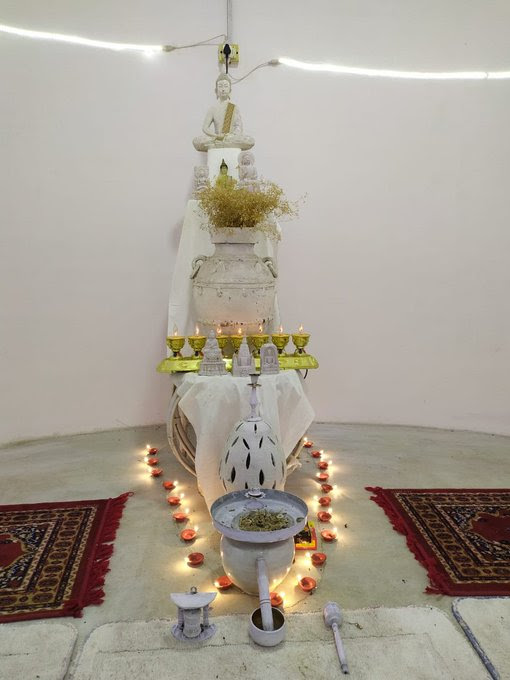66 Buddha’s Most Best Powerful Positive Own Words
DO GOOD

MIND- Let’s convert all our homes to show the Path for All Societies to
Attain NIBBANA by propagating Buddha’s Own Most Best Positive Powerful
destruction of life,taking what is not given,misbehavior in
sensuality,false speech & liquors,spirits & intoxicants that
cause carelessness.These five,are weaknesses of the training said Buddha
abandon these five weaknesses of the training, the four satipaṭṭhānas
should be developped. Which four? Here, bhikkhus, a bhikkhu remains
focusing on the body in the body, ardent, understanding thoroughly,
mindful, having subdued covetousness-affliction towards the world. He
remains focusing on feelings in feelings, ardent, understanding
thoroughly, mindful, having subdued covetousness-affliction towards the
world. He remains focusing on the mind in the mind, ardent,
understanding thoroughly, mindful, having subdued
covetousness-affliction towards the world. He remains focusing on
dhammas in dhammas, ardent, understanding thoroughly, mindful, having
subdued covetousness-affliction towards the world. To abandon these five
weaknesses of the training, the four satipaṭṭhānas should be
developped.
do we get old, get ill and die? How can we escape from suffering? The
story of how Prince Siddhartha Gautama left a life of luxury to embark
on a search for the answers, and how he eventually became the Buddha —
the Awakened One.
do we get old, get ill and die? How can we escape from suffering? The
story of how Prince Siddhartha Gautama left a life of luxury to embark
on a search …
vernietiging van die lewe, wat nie gegee word nie, misbruik in
sensualiteit, valse toespraak en drank, geeste en bedwelmers wat
onverskilligheid veroorsaak. Hierdie vyf, is swakhede van die opleiding,
het Boeddha gesê
i jetës, duke marrë atë që nuk është dhënë, sjellja e keqe në
sensualitet, fjalim të rremë dhe liquors, shpirtërore dhe joshëse që
shkaktojnë pakujdesi. Këto pesë, janë dobësi të trajnimit tha Buda
تدمير الحياة، وأخذ ما لا يعطى، سوء السلوك في الحساسية، الكلام
والخمور الكاذب، المشروبات الروحية والمسكر التي تسبب الإهمال. هذه الخمسة،
هي نقاط ضعف في التدريب قال بوذا
ոչնչացումը, վերցնելով այն, ինչը չի տրվում, զգայական, կեղծ
խոսակցություններ եւ խմիչքներ, ոգեղեն եւ խմիչքներ, որոնք անհոգություն են
առաջացնում: Դասընթացի թույլ կողմերը ասում են Բուդդային
যি দিয়া নহয় সেয়া গ্ৰহণ কৰা, কামুকতাত দুৰ্ব্যৱহাৰ, মিছা কথা আৰু সুৰা,
আত্মা আৰু নিচাযুক্ত দ্ৰব্য যি অসাৱধানতাৰ সৃষ্টি কৰে। এই পাঁচটা
প্ৰশিক্ষণৰ দুৰ্বলতা বুদ্ধই কৈছিল
məhv edilməsi, həssaslıq, saxta nitq və içkilərin, ruhların və sərxoş
olan içkilərin, ruhların beşi, buddanın zəif tərəfləri olduğunu qəbul
edən
was often asked irrelevant and pointed questions to corner him, insult
him or simply defeat him. How did Buddha answer those irrelevant
questions which were not asked with honest intentions to understand the
deeper meaning of life or to attain awakenment?
the ascetic Uttiya came to meet Buddha. After sharing the greetings he
sat on one side. He took his place and started asking irrelevant and
pointed questions. He tried to corner him and put him down through his
questions. The response of buddha and his chief disciple Ananda has got
several hidden answers to handle awkward and pointed questions.















DO GOOD PURIFY MIND-Awakened One To Create Awaken Universe among
PURIFY MIND-Awakened One To Create Awaken Universe among
Tibetans in Exile
than just aches and pain, former national swimmer Clement Lim shares
how at one point of time, the condition left him unable to get out of
bed by himself.
https://tenor.com/view/lamp-
Nibbāna) is “blowing out” or “quenching” of the activities of the worldly mind and its related suffering
Nibbāna is the goal of the Buddhist path, and marks the soteriological release from worldly suffering and rebirths in saṃsāra.
Nibbāna is part of the Third Truth on “cessation of dukkha” in the Four Noble Truths, and the “summum bonum of Buddhism and goal of the Eightfold Path.
In the Buddhist tradition, Nibbāna has commonly been interpreted as the extinction of the “three fires”, or “three poisons”, greed (raga), aversion (dvesha) and ignorance (moha).When these fires are extinguished, release from the cycle of rebirth (saṃsāra) is attained.
Nibbāna has also been claimed by some scholars to be identical with anatta (non-self) and sunyata
(emptiness) states though this is hotly contested by other scholars and
practicing monks. In time, with the development of the Buddhist
doctrine, other interpretations were given, such as the absence of the
weaving (vana) of activity of the mind, the elimination of desire, and
escape from the woods, cq. the five skandhas or aggregates.
Buddhist scholastic tradition identifies two types of Nibbāna: sopadhishesa-Nibbāna (Nibbāna with a remainder), and pariNibbāna or anupadhishesa-nirvana (Nibbāna without remainder, or final Nibbāna). The founder of Buddhism, the Buddha, is believed to have reached both these states.
Nibbāna, or the liberation from cycles of rebirth, is the highest aim of the Theravada tradition. In the Mahayana tradition, the highest goal is Buddhahood, in which there is no abiding in Nibbāna. Buddha helps liberate beings from saṃsāra
by teaching the Buddhist path. There is no rebirth for Buddha or people
who attain Nibbāna. But his teachings remain in the world for a certain
time as a guidance to attain Nibbāna.
http://sarvajan.ambedkar.org
White Home

Lab



-
56) Classical Kazakh-Классикалық қазақ,57) Classical Khmer- ខ្មែរបុរាណ,58) Classical Kinyarwanda59) Classical Korean-고전 한국어,60) Classical Kurdish (Kurmanji)-Kurdî (Kurmancî),61) Classical Kyrgyz-Классикалык Кыргыз,62) Classical Lao-ຄລາສສິກລາວ,63) Classical Latin-LXII) Classical Latin,64) Classical Latvian-Klasiskā latviešu valoda,65) Classical Lithuanian-Klasikinė lietuvių kalba,66) Classical Luxembourgish-Klassesch Lëtzebuergesch,67) Classical Macedonian-Класичен македонски,68) Classical Malagasy,класичен малгашки,69) Classical Malay-Melayu Klasik,70) Classical Malayalam-ക്ലാസിക്കൽ മലയാളം,71) Classical Maltese-Klassiku Malti,72) Classical Maori-Maori Maori,73) Classical Marathi-क्लासिकल माओरी,74) Classical Mongolian-Сонгодог Монгол,75) Classical Myanmar (Burmese)-Classical မြန်မာ (ဗမာ),76) Classical Nepali-शास्त्रीय म्यांमार (बर्मा),77) Classical Norwegian-Klassisk norsk,
-
78) Classical Odia (Oriya)79) Classical Pashto- ټولګی پښتو80) Classical Persian-کلاسیک فارسی81) Classical Polish-Język klasyczny polski,82) Classical Portuguese-Português Clássico,83) Classical Punjabi-ਕਲਾਸੀਕਲ ਪੰਜਾਬੀ,84) Classical Romanian-Clasic românesc,85) Classical Russian-Классический русский,86) Classical Samoan-Samoan Samoa,
-
87) Classical Sanskrit छ्लस्सिचल् षन्स्क्रित्88) Classical Scots Gaelic-Gàidhlig Albannach Clasaigeach,
-
89) Classical Serbian-Класични српски,90) Classical Sesotho-Seserbia ea boholo-holo,91) Classical Shona-Shona Shona,92) Classical Sindhi,93) Classical Sinhala-සම්භාව්ය සිංහල,94) Classical Slovak-Klasický slovenský,95) Classical Slovenian-Klasična slovenska,96) Classical Somali-Soomaali qowmiyadeed,97) Classical Spanish-Español clásico,98) Classical Sundanese-Sunda Klasik,99) Classical Swahili,Kiswahili cha Classical,100) Classical Swedish-Klassisk svensk,101) Classical Tajik-тоҷикӣ классикӣ,102) Classical Tamil-பாரம்பரிய இசைத்தமிழ் செம்மொழி,
Ethical Conduct-3) Right Speech(Sammaa-vaacaa)-
4) Right Action(Sammaa-kammanta)
4. Right Action: Right Action means practising the three wholesome physical deeds [kaayasucarita], namely:
1. Refraining from killing or physically torturing other living beings [paa.naatipaataa];
2. Refraining from stealing or obtaining things in a dishonest way [adinnaadaanaa];
3. Refraining from sexual relations outside marriage (committing adultery) [kaamesumicchaaraa].
Furthemore, one must not consume intoxicants such as alcohol that lead to heedlessness











